Audio Recordings from the UN Commission on the Status of Women 55th Session
(Gender, Education, Science & Technology and Employment)
February 22 - March 4, 2011
New York, USA
The Isis Media Team is in active attendance of the 55th UN Commission on the Status of Women, wherein participants include the 45 representatives of UN Member States, as well as UN entities and ECOSOC-accredited NGOs from all over the world.
The theme of this year's two-week conference is, “Access and participation of women and girls in education, training, science and technology, including for the promotion of women’s equal access to full employment and decent work.”
Engaging Young WomenPanel organised by UNIFEM Australia Moderator: Leonie-Ruth Acland |
|
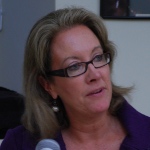
download speech (16 MB) listen to speech Dr. Elizabeth Broderick According to Dr. Broderick, Australia performs very well in terms of women's education particularly in primary and secondary education. However, she finds that the real issue is that this does not necessarily translate into success of women in the work place. In this panel, Dr. Broderick shares stories of young women in Australia as they transition from education to work. She pays particular focus on key issues that young women face which are sexual harassment in the workplace, and technology as a new frontier for violence against women on the one hand but also how it may be use to mobilise and encourage the active participation of young women. |
|
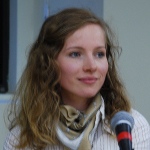
download speech (16 MB) listen to speech Catriona Stanfield Engaging young women is a two-way process, says Catriona Stanfield. She points out the importance of being mindful of how young women's involvement can allow a space for them to contribute meaningfully to organisations while also considering how this experience can contribute to their own personal growth. In this panel, Catriona speaks about young women's issues and experiences in activist work, reflecting on why it is important to engage young women, the key issues they face and finally, effective strategies to address these challenges in order to increase their interest and commitment to participate actively. |
|
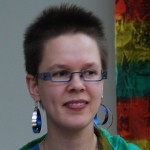
download speech (19 MB) listen to speech Jessica Notwell Jessica Notwell focuses on the importance of inter-generational leadership as a framework for involving young women. She says that the global challenges faced by women cuts through diversities, including generational differences. As such, solutions to these issues must likewise be dealt with intergenerationally. In this panel she shares how the World Wide, YWCA has been able to increase participation of young women through a framework of intergenerational leadership, which she says is an ongoing process of providing opportunities to share as equals, respecting experiences that everyone brings to the table, continuing dialogues about hopes, challenges and aspirations; and having space for mistakes. |
|
Implementing UNSCR 1325 on Women, Peace and Security: Strengthening the CSW 55 AgendaPanel organised by the Global Network of Women Peace Builders Moderator: Charles Hitchcock |
|
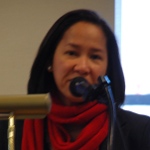
download speech (11 MB) listen to speech Mavic Cabrera-Balleza Mavic Cabrera-Balleza opens the panel with her presentation by differentiating five UN Security Council Resolutions that address women, peace and security. She provides summaries and salient points for Resolutions 1325, 1820, 1888, 1889 and 1960, as there has been much confusion surrounding these documents. She also elaborates on the processes that have taken place in the formulation of each resolution, highlighting civil society participation when applicable. She emphasises that though these are significant milestones at the UN level, it is important to note that developments do not necessarily match what is happening on the ground. |
|
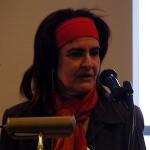
download speech (12 MB) listen to speech Martha Quintero Quintero talks about her experiences in implementing UNSCR 1325 on the ground. Quintero focuses her discussion on key issues experienced by women in armed conflict in Columbia, including the lack of participation of women in the formal peace process; the lack of protection of women and girls in situations of armed conflict, and the massive displacement of women and girls. She notes that 1325 has been ratified by the Colombian government and has been integrated into its Justice and Peace law but is currently not being implemented. She presents proposals and recommendations towards the full implementation of 1325 in her country. |
|
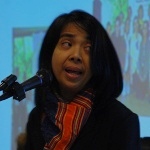
download speech (9 MB) listen to speech Jasmin Nario-Galace Also in regards to the UNSCR 1325, Nario-Galace shares the journey of women in the Philippines (both in government and civil society) towards the drafting and enactment of the Philippine National Action Plan (NAP) on Women, Peace and Security. She shares the NAP's main goals of prevention and protection, empowerment and participation, and promotion and mainstreaming , as well as the specific efforts and projects towards their fulfillment. She also highlights challenges that the country faces in implementing the resolution. |
|
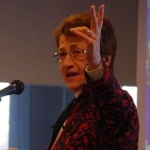 |
download speech (8 MB) listen to speech Cora Weiss download speech (5 MB) listen to speech Betty Reardon Cora Weiss and Betty Reardon both speak about UNSCR 1960, emphasising the absence of 1325 in its operational paragraphs, as well as the lack of civil society consultations when it was crafted. Both of them encourage partners and other organisations to read and sign a petition letter addressed to the UN Security Council drafted by the network, which demands regular consultations with civil society organisations, the participation of women in all levels of decision making, that UN Women includes 1325 in its top priorities, continuous consultations with women on the ground, and that the full implementation of 1325 must be substantially integral to subsequent resolutions. |
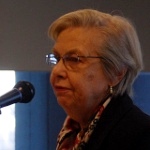 |
|
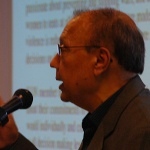
download speech (15 MB) listen to speech Amb. Anwarul K. Chowdry Lastly, Amb. Chowdry begins by stating that the CSW and 1325 are inextricably linked and emphasises that equality and participation are their core. He also states that while all security council resolutions should reflect 1325, it is also necessary to keep working towards the creation and implementation of national action plans in all member states, developing indicators as well as creating and making available mechanisms for monitoring and evaluation. He also emphasised that UN Women must be prioritised and that a lead person for this must be appointed. |
|
Sexuality, Homophobia and Transphobia: The Need to Improve Access to Education and WorkPanel organised by the International Lesbian, Gay, Bisexual, Trans and Intersex Association and its partners Moderator: Kenita Placide Issues around sexuality as well as homophobia, transphobia and gender stereotypes limit access to education and work within the school system. They have an impact on children, youth, parents and all working within the school systems, and ultimately influence access to full employment and decent work. This panel discusses these issues as well as presents some best practices from around the world to work towards access for all. |
|
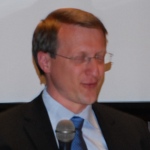
download speech (10.7 MB) listen to speech Thomas Lambert Mr. Thomas Lambert begins his talk by sharing that Belgium, being one of the first countries to institutionalise same-sex marriage in 2003 and to legalise co-parenting in 2006, has had to put forward strategies, particularly in its education systems (both the French and Flemish systems) that would enable educators to communicate these milestones, as well as LGBTQI issues for young people. He talks about these strategies and elaborates in detail in his speech. |
|
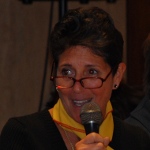
Dianne Schneider Dianne Schneider emphasises the importance of the inclusion of LGs in history, as well as taking the time to discuss issues of discrimination and phobia. |
|
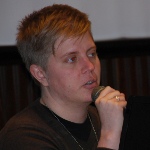
download speech (4.03 MB) listen to speech Jonah Nylund Jonah Nylund shares experiences of young people in Sweden through work with policy makers and youth workers towards educating and capacitating other young people about LGBTQ issues. Jonah shares how these efforts have been guided by a norm-critical framework. |
|
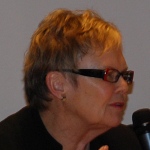
download speech (10.42 MB) listen to speech Gill Greer Gill Greer's speech focuses on gender stereotypes that influence girls to choose subjects and courses in school that ultimately influence their job or career choices. |
|
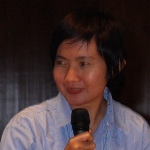
download speech (7.44 MB) listen to speech Kamilia Manaf Kamilia Manaf shares how she and her organisation have sought to educate young people about LGBTQ issues through the popularisation of the Yogyakarta Principles, translating its content and language into a comic book, thus making it it more accessible and easier to understand for young people. |
|
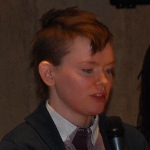
download speech (7.26 MB) listen to speech Haven Herrin Haven Herrin shares the experiences of her organisation, Soulforce Q and its awareness work for young people about LGBTQ issues, particularly in Christian schools. She likewise shares her experiences as a teacher in public school, communicating these issues to students. She stresses the need to look beyond tolerance and equality towards a deeper examination of gender and violence. |
|
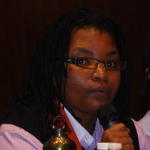
download speech (6.9 MB) listen to speech Linda Baumann Linda Baumann shares about experience of LGBTQs in Africa where their issues are not recognised. She emphasises the importance of sex education that includes discussions on sexuality as well as the need for a survey to prove the existence of discrimination against LGBTQs in the hope of initiating efforts towards policy reform. |
|
Engendering Technologies: Women Take ChargePanel organised by the International Association of Women in Radio and Television (IAWRT) Moderator: Olya Booyar |
|
|
Kelly Matheson Kelly Matheson shares about Witness' training programme in Uganda that aims to capacitate women to produce films to influence policy reforms. In particular, she talks about how women have used video and film to express both their disappointment at the Ugandan government's inability to fully implement its Peace Recovery and Development Plan, as well as their demands from the government for an immediate response to address this issue. |
|
|
download speech (3.51 MB) listen to speech Madeleine Memb Madeleine Memb shares her experience of working with women in Cameroon in addressing the issue of female genital mutilation. She shares IAWRT's experience in working with ethnic groups in the country who continue to practice FGM, training community women on the use of video and film in mainstreaming the issue. She also shares challenges they encountered, including issues of censorship, the lack of technological skills of women, as well as ethical issues involving women on the ground. She emphasises the great need for engendering technologies by training women in the use of these technologies, so that they may be self operational and autonomous, and thereby able to effectively communicate their issues. |
|
|
Cai Yiping Yiping talks about Isis' initiatives towards training women on feminist development communication through the Isis International Activist School. Isis has trained grassroots women in the Asia Pacific region in the use of different media and technologies in advocating for women's rights. She also notes the challenges encountered by women, such as fear of using these technologies, the lack of user-friendly technology, the need to bridge gaps in the use of traditional media and new ICTs as well as the need for effective communication strategies for women's rights. |
|
|
download speech (4.65 MB) listen to speech Maureen Nappi Maureen Nappi talks about women in media and how they have been absent or behind the scenes in the creation and production of media products. |
|
|
Devi Leiper Devi Leiper presents her young woman's feminist perspective on emerging media tools and technologies. She begins by speaking about her personal experiences regarding technology and its impact on her life growing up in Cambodia, and moves on to discuss technology in the broader sense of the women's movement. She points out how on the one hand, technology can create connections between and amongst women's movements across the globe, creating and improving women's agency, but states that it has also largely remained a male domain, presenting a variety of issues and challenges for women on the ground. |
|
|
download speech (12.34 MB) listen to speech Jamia Wilson Lastly, Jamia Wilson talks about the potentials of social media as tools for effective information sharing and advocacy. She talks about how social media, being succinct, transformational and timely, can be a powerful tool for change. |
|
Re-strategizing the Use of Media and ICTs for Empowering Women on the GroundPanel organised by Isis International Moderator: Cai Yiping |
|
|
Zarima Koichumanova Zarima Koichumanova emphasizes the value in combining knowledge of human rights and ICT tools as a way to empower young women and strengthen young women's human rights advocacy. She voices the need for women's NGOs to collaborate with other non-women's organisations, as well as the need for young women's representation and participation in trainings and conferences. She also speaks about her organisation's experience in training journalists to incorporate gender sensitivity in their work, who then train other journalists to do the same. |
|
|
Sitti Hajar Noviana Sitti Hajar Noviana shares her personal experiences of abuse and furthermore, how she gained courage through NGO work. Media, she explains, is important for her organisation's Reproductive Health and LGBT rights advocacy, but access to technology is a challenge; so they use music, booklets and face to face communication, stressing the latter as the most important form. Sitti also elaborates upon the value of the relationships she's built and the positive space and support that was created across women's differences at the Isis International Activist School for Young Feminist Leadership. |
|
|
Ramida Katharina Sinaga Ramida Katharina Sinaga gives insight into her organisation's work towards women's economic and political empowerment. As many of the rural grassroots women are illiterate, they use photos to inform women about parliamentary candidates, especially women candidates. Media helps to facilitate information sharing and enables voices and visibility for marginalized groups such as grassroots and LGBTQ women. |
|
|
download speech (11.13 MB) listen to speech Devi Leiper Devi Leiper talks about her work at Global Fund for Women, guided by the belief that women's leadership is necessary in overcoming challenges faced by women, and that aside from physical resources (such as equipment), funding is meant to support women in all of the work that they do. She then shares some examples of the work done by GFW fundees who could not be at the CSW, including femLINK pacific in Fiji, Messenger Band in Cambodia, Women and Children's Crisis Centre in Tonga, and the Feminist Approach to Technology in India, who all use different forms of media in their advocacy work to address women's issues. |
|
|
Anna Dinglasan Anna Dinglasan speaks from her experiences as a young feminist in the Philippines, collaborating with other young feminists to create a space of open and deep sharing that can sometimes be lacking in intergenerational settings. She goes on to explain the conceptualization of the Isis International Activist School as an outcome from its People's Communication for Development research study, which aims to maximize grassroots women's use of both traditional and new media tools for advocacy work, as well as the inspiration for the Young Feminist Leadership Activist School due to a lack of young women's voices at the UNCSW 54. |
|
Priorities for UN Women: Country Level Work; Presentation of Global surveyPanel organised by Oxfam-Novib
Survey presented by Daniela Rosche This survey was conducted by Oxfam-Novib to find out NGOs' opinion about UN Women. Approximately one hundred CSO’s from 75 countries participated in this survey, excluding OECD countries. Some key findings included Violence Against Women as an area that must be a top priority for UN Women to address urgently at the country level, with 99% of respondents identifying the issue as urgent. Other issues deemed to be priorities were women in decision-making, as well as access to a reliable justice system. Eighty-six percent of the respondents said that UN Women should work with NGOs, including women’s rights organizations as partners. Results also show that UN Women should work with governments, since the governments hold decision-making power over women’s rights legislation in their respective countries. Furthermore, UN Women must also consider civil society groups as genuine partners at the country level, and there needs to be more contact and dialogue between UN agencies and civil society, including grassroots organizations and collaboration with CSOs. |
|
Using the Yogyakarta Principles for LGBT Human Rights ActivismPanel organised by ILGA This panel explores the question, “How can activists around the world working for the human rights of lesbian, gay, bisexual, transsexual and transgender (LBGT) people create change through the use of the human rights-based Yogyakarta Principles?” Moderator: Sara Perle, ILGA |
|
|
download speech (8.59 MB) listen to speech Kim Vance Kim Vance talks about the newly published, An Activist's Guide to the Yogyakarta Principles, a toolkit that provides an overview of the document, using simpler language, and featuring various case studies from all over the world. |
|
|
download speech (4.39 MB) listen to speech Kamilia Manaf Kamilia Manaf shares her experience as a young LGBT activist in Indonesia, using the Yogyakarta principles to help young people become more aware of their rights. She explains how her organisation, Pelangi Perempuan has collected case studies from young LGBT people in Indonesia and used them as stories for a comic book that was published and aimed at educating young people about the Yogyakarta Principles. |
|
|
Justus Eisfeld Justus Eisfeld elaborates upon how the Yogyakarta Principles can be effective when bringing to light LGBT issues from a human rights perspective, particularly in lobbying with governments. However, he also says that while it is a good document to cite, activists must still keep constant watch on their governments if the principles enshrined in the document are to be upheld. |
|
|
Linda Baumann Linda Bauman provides insight into how Out-Right has used the Yogyakarta Principles in addressing LGBT issues in Namibia. She shares specific case studies to illustrate this. |
|
The Empowerment of Rural Women and Their Role in Poverty and Hunger Eradication, Development and Current ChallengesFormal Session organised by the UN Commission on the Status of Women |
|
|
download speech (7.83 MB) listen to speech Emma SiliPrandi Emma SiliPrandi addresses rural poverty agriculture and food security, touching on the situation of women in the agricultural and food security sectors, both through UN agencies and in Brazil. She says that women in agriculture are not visible in domestic life, do not have decision-making power within the family unit, and cannot spend their own earned money. Moreover, rural women lack the civil professional documents necessary to access public policy. She speaks of her experiences in Brazil advocating for the recognition of women farmers as having rights. Women’s NGOs were included in this process and resulted in a higher respect for women as leaders of their communities. |
|
|
download speech (8.62 MB) listen to speech Marcela Villareal Marcela Villareal talks about agriculture and farm employment as a basis of rural women's economic empowerment. She stresses that economic empowerment of rural women is central to other women’s empowerment. She also advocates for women to have equal access to agricultural resources and voices the need for women's work to be made more visible. |
|
|
download speech (8.07 MB) listen to speech Marzia Fontana Marzia Fontana describes access to decent work as a pathway to rural areas women’s empowerment. She says that cooking, caring for children and other household chores take lot of time for women and yet these contributions are not fully recognized. She forwards that rural women need to have access to stable and decent work, as well as the capacity to participate in politics. Moreover, this participation requires change in strategies and policy towards involving rural women in the political process. Legislation needs to be translated into concrete activity. |
|
Women’s Strategies in Non-formal Economic Activities in Armed Conflict SituationsPanel organised by APWW |
|
|
Nurgul Djanaeva Nurgul Djanaeva talks about how the ethnic conflict in Osh Oblast in Kyrgyzstan has affected women, as many of them lost their jobs and those with small businesses did not produce adequate income for their family. She shares about the projects aimed at peace building in this area initiated by the Forum of Women’s NGOs. Amongst them are the conduct of twenty training workshops for women. |
|
|
Nga Nga Nganga speaks about the impact of armed conflict on women in Burma. She shares that women from her community have started to engage in different kinds of work in order to provide for |
|
|
Sepali Kattegoda Sepali talks about how women have engaged in informal economic activities in response to rising unemployment rates in post-conflict Sri Lanka. She shares how this has been a pressing issue in the country as the focus of rehabilitation has been on rebuilding communities and macro-economics, making women's contribution to the economy through these informal activities invisible. |
|
|
Avazkan Ormonova Talks about the ethnic conflict in Osh Oblast and how women have suffered and how her organisation has helped in peace building in the area. She says women need knowledge and skills and in response, women’s NGOs in Osh Oblast collaborated and jointly developed strategies in order to provide training and capacity building for women. |
|
|
Anna Dinglasan Anna talks about Isis' research project on Cultural Politics of Conflict, Peace and UNSCR 1325. She shares that although the study focused on women's participation in the formal peace process, narratives illustrate that women in Mindanao, Philippines consider livelihood as an integral part of their participation in peace building. |
|
|
download speech (9.34 MB) listen to speech Carole Shaw Carol talks about Australia's experience in responding to the needs of migrants and refugees from countries experiencing conflict. |
|
The Impact of the Systemic Crisis on Women: Responses to Date and Feminist AlternativesPanel organised by Association for Women's Rights in Development (AWID), Center for Women’s Global, Leadership (CWGL), ActionAidModerator: Natalie Raaber As part of a broader debate on economics, women’s human rights and development, this interactive session brings together gender equality and women’s rights activists who share their insights and work on the impact of the systemic crisis on women and women’s human rights. The gendered implications of the crisis in various contexts is discussed, as well as feminist responses and challenges to the current system. |
|
|
Rania Antonopoulos Rania Antonopoulos talks about the emerging political and policy environment, the impact of the economic crisis and its policy responses on women, as well as considerations towards an action policy platform. |
|
|
Nurgul Djanaeva Nurgul Djanaeva speaks about the impact of the global economic and financial crisis on women and their families in Central Asia. Unemployment is one of the consequences of the global crisis and the lack of jobs results in labor migration. She also talks about the situation in Central Asia, where poor women also suffer from lack of state funding for childcare facilities. The economical, financial and social status of women, their well-being and human rights are worsening not only due to the global financial crisis, but also due to poor governance and political instability. |
|
|
Norma Sanchís Norma Sanchis addresses the impact of the global economic crisis in Latin America. She shares that although this crisis has affected Latin American countries at varying levels, this crises has had less of an impact than crises of the past. She goes on to explain the different factors contributing to this reality. |
|
|
Rosa Lizarde Rosa Lizarde talks about the feminist task force, created in the 2005 CSW as well as GCAP's advocacy work. She notes how GCAP established a tribunal in 2007 to attract grassroots NGOs work and voices, and speaks about the 2008 tribunal, which was focused on poverty in North. |
|
Take Back The Tech! Reclaiming Technology for Women's Rights25 February, 2011 Moderator: Jan Moolman |
|
|
Dafne Plou Dafne Plou offers an overview of the Feminist Tech Exchanges, a series of capacity building workshops in Asia, Africa and Latin America that build on women's already existing technology skills. The Feminist Tech Exchanges also incorporate gender and technology and inform women about how to use technology strategically and safely in women's rights activism, and in work to end violence against women. She finishes by showing a video created by women during a workshop in Montevideo, Uruguay. Watch the video at http://www.vimeo.com/20637646 |
|
|
Harriet Musoke Harriet Musoke presents the history and current work of Isis WICCE and their use of technology in advocating to end violence in post-conflict situations, including theatre, video, radio, documentaries and digital storytelling. She also reviews Isis WICCE's use of various communication tools for addressing policy makers and globally disseminating information on forms of violence against women, and finally voices the need to invest in technology for advocacy. watch the video at http://www.vimeo.com/20636508 |
|
|
Jac sm Kee Jac sm Kee introduces the Take Back The Tech! and I Don't Forward Violence campaigns, as well as the EROTICS - Exploratory Research on Sexuality and the Internet – project, which took place in Brazil, India, South Africa, Lebanon and the USA. The Take Back The Tech! campaign calls users of Information and Communications Technology to take control of it by defining and shaping it to end violence against women. This is the third out of three presentations. Watch the video at http://www.vimeo.com/20636683 |
|
|
Jan Moolman Jan Moolman facilitates the question and discussion session. watch the video at http://www.vimeo.com/20637971 Visit http://www.takebackthetech.net/take-action/2011/02/25 to take action and join the campaign. Visit http://www.takebackthetech.net/pledge/i-dont-forward-violence to join the latest campaign. |
|




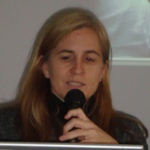
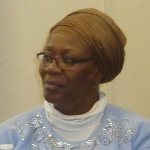
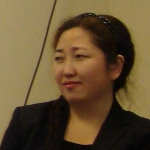
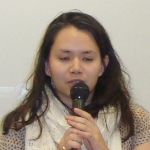

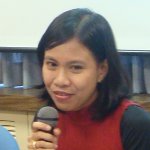
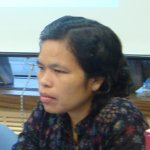
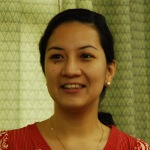
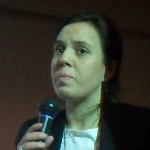 download speech
download speech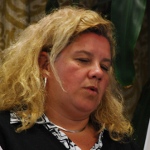
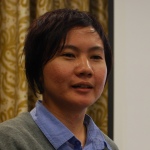

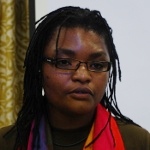
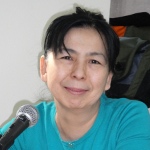
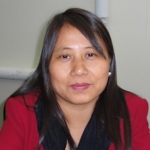
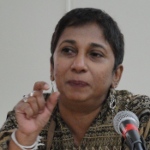
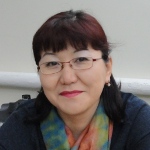
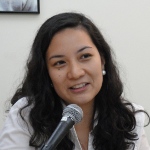
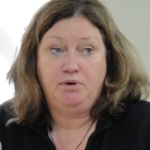
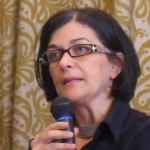
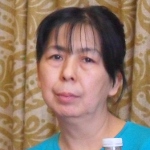

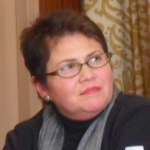

 The
The 
 Isis Resource Center holds one of the largest feminist collections of materials in the Global South. With 40 years of publication experience, Isis holds a vast collection.
Isis Resource Center holds one of the largest feminist collections of materials in the Global South. With 40 years of publication experience, Isis holds a vast collection.